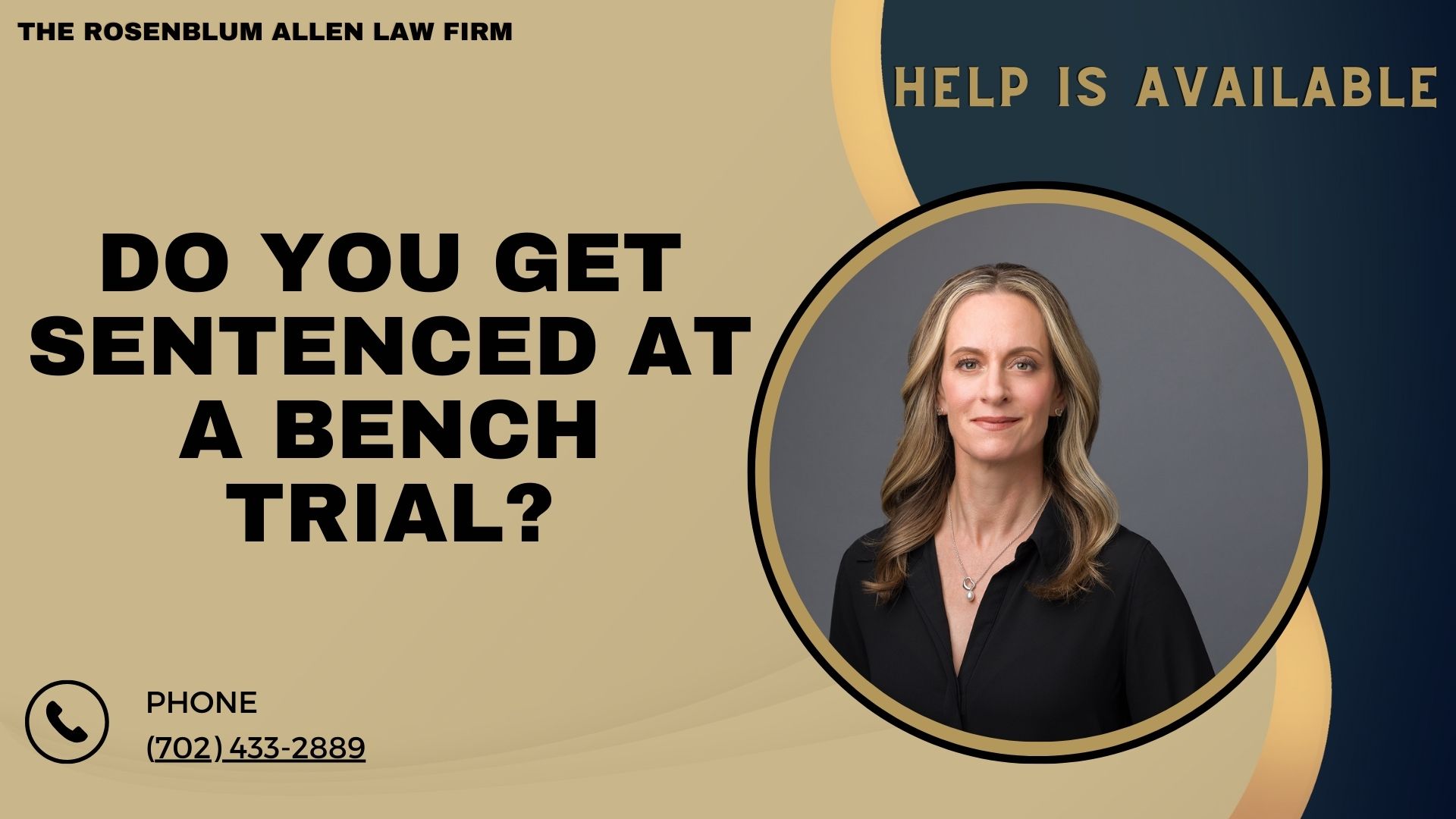Legal proceedings are stressful, especially when the outcome deeply affects life. Understanding each trial phase can ease anxiety. Bench trials are a cornerstone of the judicial system. In them, a judge, not a jury, decides the outcome. They are a focal point for many such concerns. One common question arises: “Do you get sentenced at a bench trial?” This article delves into bench trials. It aims to demystify the process and outcomes.
 Understanding Bench Trials
Understanding Bench Trials
Bench trials streamline their process. A single judge handles adjudicating the facts and applying the law. This type of trial is different from jury trials. The community’s laypersons decide the facts. They do so with a judge’s guidance. The judge interprets the law.
Definition and Characteristics of a Bench Trial
At its core, a bench trial occurs without a jury. The judge is the trier of fact. They test the evidence and make the final judgment. This process is often quicker than a jury trial. It skips jury selection and simplifies some procedures.
Role of the Judge in a Bench Trial
The judge plays a multifaceted role in a bench trial. They must:
Evaluate the credibility of witnesses.
Assess the admissibility and weight of evidence.
Apply the relevant law to the facts of the case.
Deliver a verdict based on their findings.
Comparing Bench Trials to Jury Trials
Bench trials and jury trials differ significantly in their processes and dynamics. Here are a few key differences:
Decision Maker: In bench trials, the judge decides the outcome, whereas, in jury trials, a group of citizens makes the decision.
Duration: Bench trials are typically shorter due to the absence of jury selection and deliberation.
Procedural Flexibility: Bench trials often allow for more flexibility in presenting cases, as judges are experienced in the law and can more easily navigate complex legal arguments.
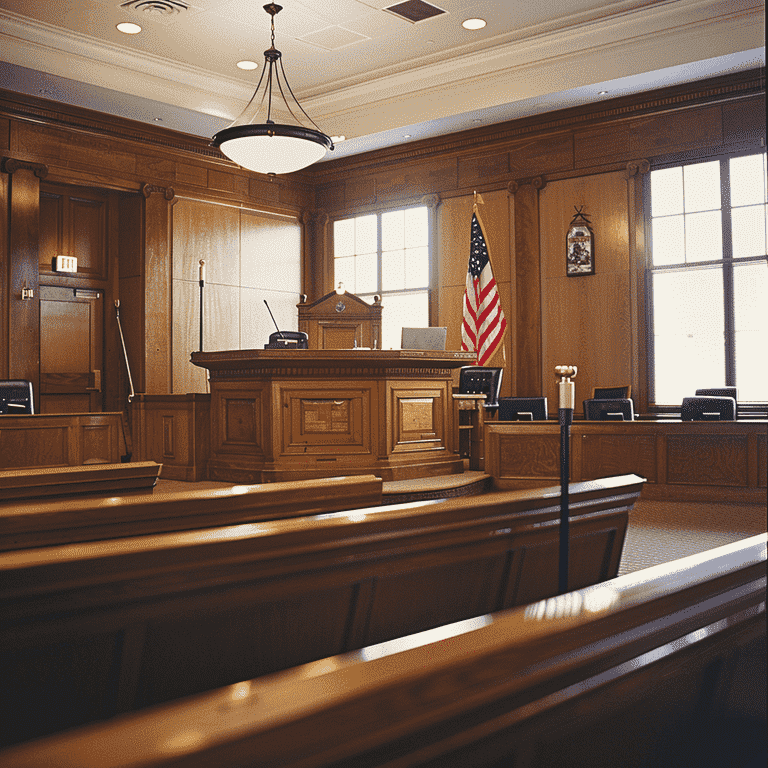
The Bench Trial Process
Understanding bench trials can demystify what to expect. This is for litigants and interested observers. Each phase is crucial, from pre-trial preparations to the presentation of evidence.
Pre-trial Motions and Preparations
Before the trial officially begins, both parties can file pre-trial motions. The motions can ask the court to make confident decisions on legal issues before the trial. For example, they can ask to exclude evidence or to dismiss the case.
Filing Pre-trial Motions
Pre-trial motions may include:
Motion to Dismiss: Arguing that the case should not proceed due to a lack of legal foundation.
Motion in Limine: Seeking to prevent specific evidence from being presented at trial.
Preparing Evidence and Witness Lists
Both parties must also prepare their cases, which involve:
Gathering physical and digital evidence
Creating a list of witnesses to call and preparing their testimonies
Anticipating the opposing side’s arguments and preparing counterarguments
Opening Statements
The opening statement is each party’s first chance. They use it to present their case to the judge. It sets the stage for the evidence and arguments that will follow.
Purpose of Opening Statements in a Bench Trial
The primary goals of an opening statement are to:
Provide a roadmap of the case.
Highlight key evidence and arguments.
Establish a narrative that will resonate with the judge.
Strategies for Effective Opening Statements
To make an impactful opening statement, lawyers often:
Begin with a compelling story or fact.
Clearly outline the evidence that will be presented.
Avoid legal jargon to ensure the narrative is accessible.
This overview introduces the key parts and steps of bench trials. It emphasizes the judge’s pivotal role. It also demonstrates the structured yet flexible nature of the trials. Understanding these parts can ease some trial uncertainties. It can also bring clarity to those starting this journey.
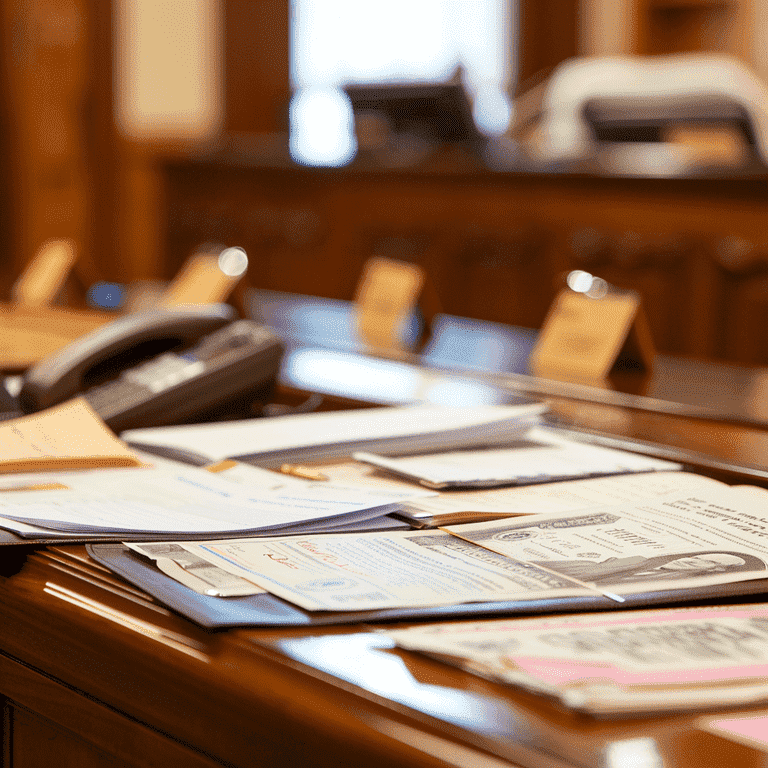
Presentation of Evidence
Once the attorneys make their opening statements, the trial enters a new phase. In it, both sides present their evidence. This is where the judge lays out the key details of the case. It includes witness testimonies, physical evidence, and relevant documents or digital content.
The Role of Witness Testimony and Cross-Examination
Witnesses are crucial in bench trials. They give firsthand accounts. These accounts support or challenge the claims at stake.
Direct Examination: This is when a witness is first called to the stand by the party summoning them. The goal is to establish the facts supporting this party’s side of the story.
Cross-Examination: After a witness has been examined by the party that called them, the opposing party can question the witness. The aim is often to challenge the witness’s credibility or the accuracy of their testimony.
Admitting Physical and Digital Evidence
Not all evidence comes from words from a witness’s mouth. Physical items and digital records can also play a pivotal role.
Physical Evidence: Items related to the case, like documents, photographs, or objects, can be presented to the judge. Each piece must be appropriately introduced and explained in its relevance.
Digital Evidence: Emails, text messages, or digital files can be crucial. Like physical evidence, digital evidence must be authenticated and shown to be relevant to the case.
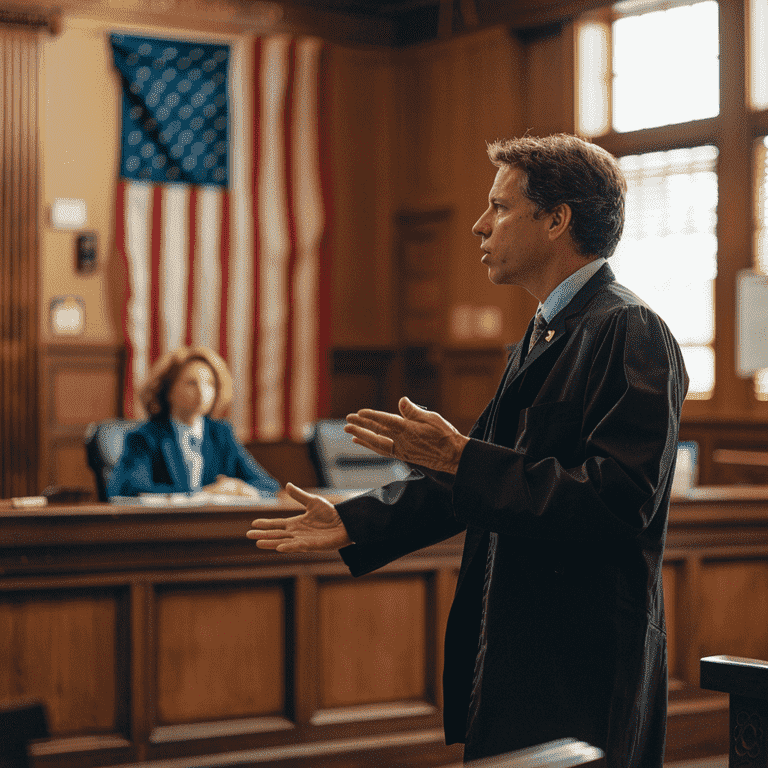
Closing Arguments
After showing all the evidence. Then, both parties can make their closing arguments. This is their last chance to impress the judge and influence the trial’s outcome.
Summarizing the Case for the Judge
In the closing arguments, each side sums up the key points of its case. They highlight the evidence supporting their position and question the reliability or relevance of the opponent’s evidence.
Highlight Strengths: Focus on the most substantial evidence and how it supports your case.
Address Weaknesses: Acknowledge any weaker points but explain why they should not detract from the overall strength of your case.
Final Appeals to the Judge’s Decision-Making
This is also a time for the lawyers to appeal to the judge. They will appeal to the judge’s sense of justice and legal reasoning. They will urge the judge to view the case favorably for their client.
Legal Precedents: Citing similar past cases where the law was interpreted in your favor.
Equity and Fairness: Beyond the strict letter of the law, arguments may also appeal to the judge’s sense of fairness and equity.
The evidence and closing arguments are the heart of the bench trial. Each side’s detailed story is fully shown there. The aim is to present facts. They should be woven into a story that resonates with the judge. The story should be backed by solid legal arguments and an appeal to justice. This phase is critical. It sets the stage for the judge to decide. They will combine evidence and legal principles to reach a verdict.
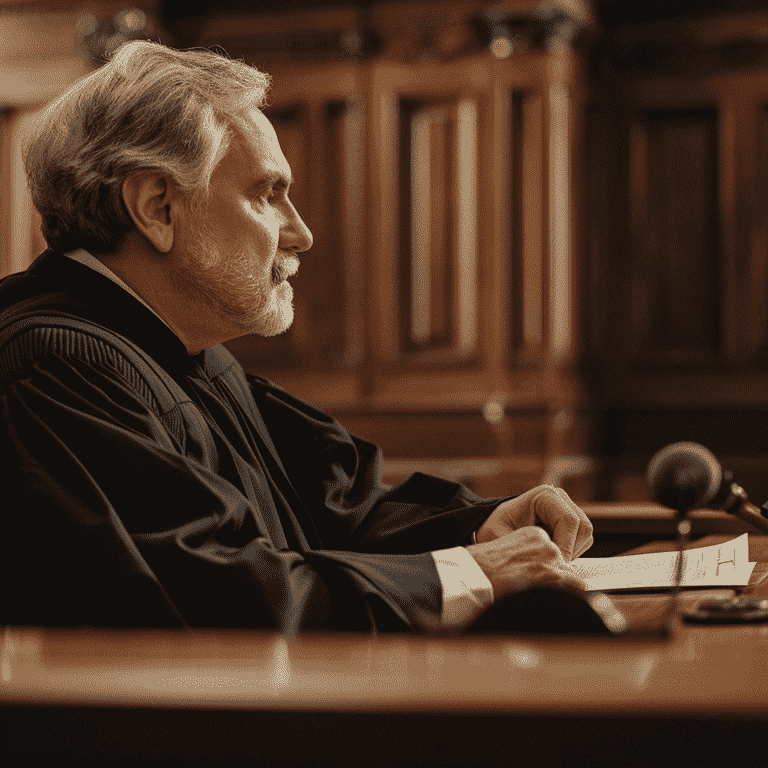
Verdict and Sentencing in Bench Trials
The climax of the bench trial is the delivery of the verdict and, if applicable, the sentencing. This is where the judge decides. They base the outcome on evidence and arguments.
How Verdicts are Determined in Bench Trials
In a bench trial, the judge plays the pivotal role of both the trier of fact and the law interpreter. They assess the evidence and the witnesses. They interpret the laws that apply and then give a verdict.
Evaluation of Evidence: The judge reviews the evidence, considering its relevance and reliability.
Legal Standards: The judge applies the relevant legal standards to the facts the evidence establishes.
Sentencing Phase Explained
The verdict is guilty in criminal cases or in favor of the plaintiff in civil ones. Then, the judge moves on to sentencing. This might take some time; sometimes, there’s a separate hearing.
Timing of Sentencing after a Guilty Verdict
Immediate Sentencing: In some cases, especially for less complex matters, the judge may deliver the sentence immediately following the verdict.
Scheduled Sentencing Hearings: For more severe or complex cases, a separate sentencing hearing might be expected to allow for the preparation of pre-sentencing reports or further arguments.
Factors Influencing Sentencing Decisions
The judge considers a variety of factors when deciding on the sentence, including:
Legal Guidelines and Sentencing Ranges: Many jurisdictions provide guidelines that suggest appropriate sentencing ranges for specific offenses.
Mitigating and Aggravating Circumstances: Factors that might lessen or worsen the perceived severity of the offense, such as the defendant’s background or how the crime was committed.
The Right to Appeal
The conclusion of a bench trial doesn’t necessarily mean the end of the road. The losing party can appeal the verdict or the sentence.
Grounds for Appealing: These might include claims of legal errors, improper admission or rejection of evidence, or that the verdict was against the weight of the evidence.
The Appellate Process Explained: An appeal is not a new trial but a review of the trial court’s proceedings to ensure legal standards were met. The appellate court examines the record of the trial court’s actions and decisions.
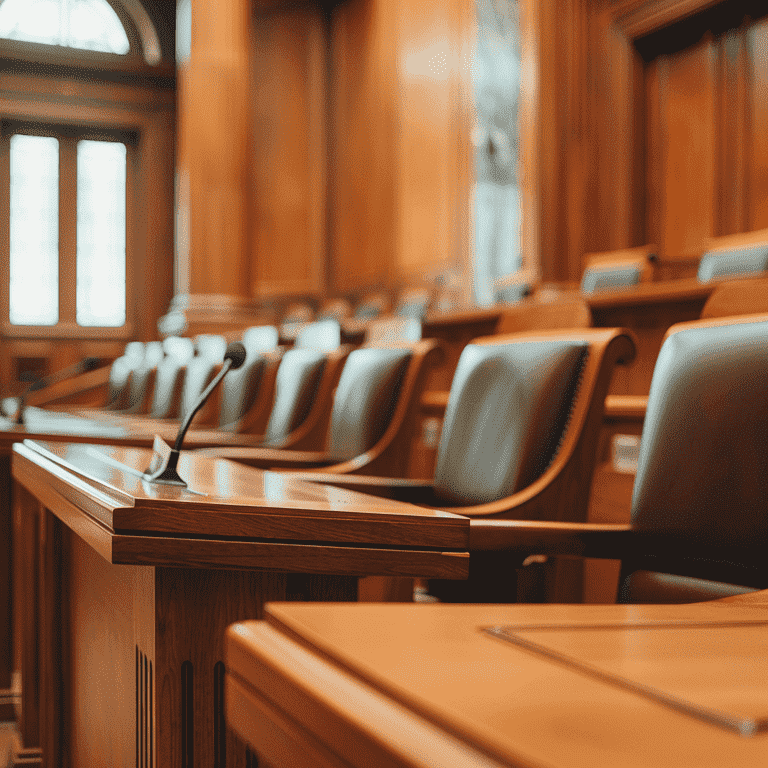
Special Considerations in Bench Trials
Choosing a bench trial over a jury trial is a strategic decision. It can greatly impact the case’s outcome. Understanding when a bench trial might be helpful or disadvantageous is crucial.
Strategic Reasons for Choosing a Bench Trial Over a Jury Trial
Several factors might lead a defendant or plaintiff to prefer a bench trial.
Types of Cases More Suited for Bench Trials: Complex legal issues that confuse a jury or cases where emotional appeals are less likely to sway the decision-maker.
Advantages and Disadvantages: Bench trials can be quicker and less costly, but they also put the case’s outcome in the hands of a single individual.
The Judge’s Discretion and Its Impact
The judge’s background, views, and understanding of the law can greatly affect the outcome of a bench trial.
Judge Bias or Expertise: A judge’s particular legal expertise or inherent biases might affect their interpretation of the evidence or the law.
Strategies for Presenting a Case to a Judge: Tailoring arguments to the judge’s known preferences or legal perspective can be crucial.
In short, the bench trial process has many parts. These include presenting evidence, giving a verdict, and sentencing. It also involves the chance of appeal. It requires a deep understanding of legal strategy. And, an appreciation for the court’s complexity. Special considerations arise. They involve choosing between a bench trial and a jury trial. This choice is strategic. It highlights the importance of informed decision-making in legal proceedings.

Breaking It All Down
Navigating a bench trial can be hard. It’s full of legal jargon, procedural details, and strategy. But, understanding the basics of how these trials work is key. They go from the opening statements to the final verdict and possible sentencing. This can demystify the process and make it more approachable for those involved.
Bench trials offer a unique view into the judicial system. A single judge fills the roles of fact-finder and law interpreter. It is different from the jury trials in the media. But, this process has its advantages. This is especially true for cases with complex legal issues. Quick resolution is best.
You should carefully decide to opt for a bench trial over a jury trial. Consider the case’s specifics, the judge’s background, and the best legal strategies. You must understand the judge’s view and the law well. This is key to presenting evidence, making closing arguments, and navigating sentencing.
In the end, one might be a plaintiff, defendant, or an observer. Understanding bench trials enriches one’s view of the law. It shows the importance of informed legal strategy. It also shows the value of thorough preparation. It shows the judiciary’s critical role in interpreting and applying the law. By demystifying this, we hope to have brought clarity and reassurance. We aim to help those starting on this legal journey.

Frequently Asked Questions
What distinguishes a judge's decision-making process from that of a jury?
A judge relies on legal expertise to apply the law to the case’s facts, while a jury bases its decision on presented evidence, guided by the judge’s instructions, with emotions sometimes influencing their verdict.
Is it possible for one party to request a bench trial, or must both parties agree?
In criminal cases, the defendant can typically request a bench trial, but this may vary based on jurisdictional laws. In civil cases, both parties usually need to agree to waive a jury trial in favor of a bench trial.
How long does a bench trial usually last?
The duration of a bench trial varies widely depending on the case’s complexity, evidence, and the court’s schedule. Generally, bench trials are shorter than jury trials due to fewer procedural steps.
Are bench trials open to the public?
Yes, bench trials are typically public proceedings, akin to jury trials. However, the court may restrict attendance or close the proceedings to safeguard privacy or sensitive information.
What recourse do I have if I disagree with the judge's verdict in a bench trial?
If you disagree with the verdict, you may have the right to appeal. An appeal entails requesting a higher court to review the trial court’s decision for legal errors that could have impacted the outcome.
How does the appeal process differ from a bench trial?
The appeal process involves reviewing the record from the original trial for legal errors. Appellate courts generally do not hear witness testimony or consider new evidence, focusing solely on legal arguments.
What are some common pre-trial motions in a bench trial?
Common pre-trial motions include motions to dismiss (arguing the case should not proceed), motions in limine (requesting specific evidence be excluded), and motions for summary judgment (arguing the case can be decided on legal issues alone due to no factual dispute).
How can I prepare for a bench trial?
Preparation entails gathering relevant evidence, organizing witness testimony, understanding legal arguments, and consulting with an experienced lawyer familiar with bench trials.
Does the judge provide reasons for their decision in a bench trial?
Yes, judges typically offer reasoning behind their decision, explaining how they interpreted and applied the law to the case’s facts, which is crucial for potential appeals.
Are there any cases that a bench trial cannot decide?
While bench trials can handle most cases, exceptions exist depending on local laws. For example, in the U.S., criminal defendants have the right to a jury trial for serious offenses, although they can waive it for a bench trial.

Additional Resources for You
As we strive to provide comprehensive legal insights and support for those navigating complex legal situations, it’s important to remember that our lead attorney, Molly Rosenblum Allen, Esq., has also created a wealth of resources across various legal areas. Whether you’re facing charges or seeking legal advice, The Rosenblum Allen Law Firm offers expertise in a wide array of legal services:
- For those dealing with criminal charges, explore our dedicated Criminal Defense Attorneys resource.
- If you’re facing DUI charges, our Las Vegas DUI Lawyer page provides essential information and support.
- For issues relating to domestic violence, check out our Domestic Violence Lawyer Las Vegas services.
- Our Drug Possession Lawyer resources are invaluable for those navigating drug-related charges.
- If you’re accused of a sex crime, our Sex Crimes Attorney section offers specialized legal support.
- Facing allegations of child abuse or neglect? Our CPS Defense Attorney can help protect your rights.
- For minor offenses, consult our Misdemeanor Lawyer resources for guidance.
- Address warrants proactively with our Las Vegas Warrant Defense Attorney services.
- Navigating probation issues? Our Las Vegas Probation Violation Attorney can offer assistance.
- For theft-related charges, our Theft Crime Defense Lawyer is at your service.
- Dealing with kidnapping charges? Our Kidnapping Lawyers provide effective defense strategies.
- Our Juvenile Defense Lawyers specialize in cases involving minors.
- For firearm-related legal issues, explore our Firearms Lawyer Las Vegas services.
Molly Rosenblum Allen, Esq. and The Rosenblum Allen Law Firm are committed to offering comprehensive legal support across a wide spectrum of issues. These resources are designed to aid you in your time of need, providing effective advice and defense strategies tailored to your unique situation.

Outside Resources for You
American Bar Association: A comprehensive source for legal resources, including public education, legal profession support, and accreditation of law schools.
FindLaw: Offers a wealth of information on a wide range of legal topics, legal documents, and an attorney directory for legal representation across different areas.
Justia: Provides free access to a wide array of legal information, including case law, statutes, regulations, and legal articles.
National Association of Criminal Defense Lawyers (NACDL): A professional organization that provides resources, networking, and advocacy for criminal defense attorneys.
Avvo: An online legal services marketplace that offers legal advice, lawyer referrals, and access to a database of legal information.
The National Domestic Violence Hotline: Offers confidential support and resources for those affected by domestic violence.
Substance Abuse and Mental Health Services Administration (SAMHSA): Provides critical information and support for individuals struggling with substance abuse and mental health issues.

A Special Message from Our Lead Attorney, Molly Rosenblum Allen, Esq

Dear Reader,
Thank you sincerely for taking the time to explore the resources we’ve provided. I hope you found the information insightful and empowering. You are navigating through what may be a challenging time in your life.
At The Rosenblum Allen Law Firm, we are deeply committed to giving knowledge. We give real help and legal expertise to those in need. Each situation is unique, and navigating the legal landscape can often feel overwhelming. It is during these times that professional guidance becomes invaluable.
If you feel ready to discuss your situation and see how we can assist you, I invite you to call me and my team at (702) 433-2889. We can work together to understand your needs. We can also explore the best path forward.
Looking forward to the opportunity to assist you,
Molly Rosenblum Allen, Esq.

